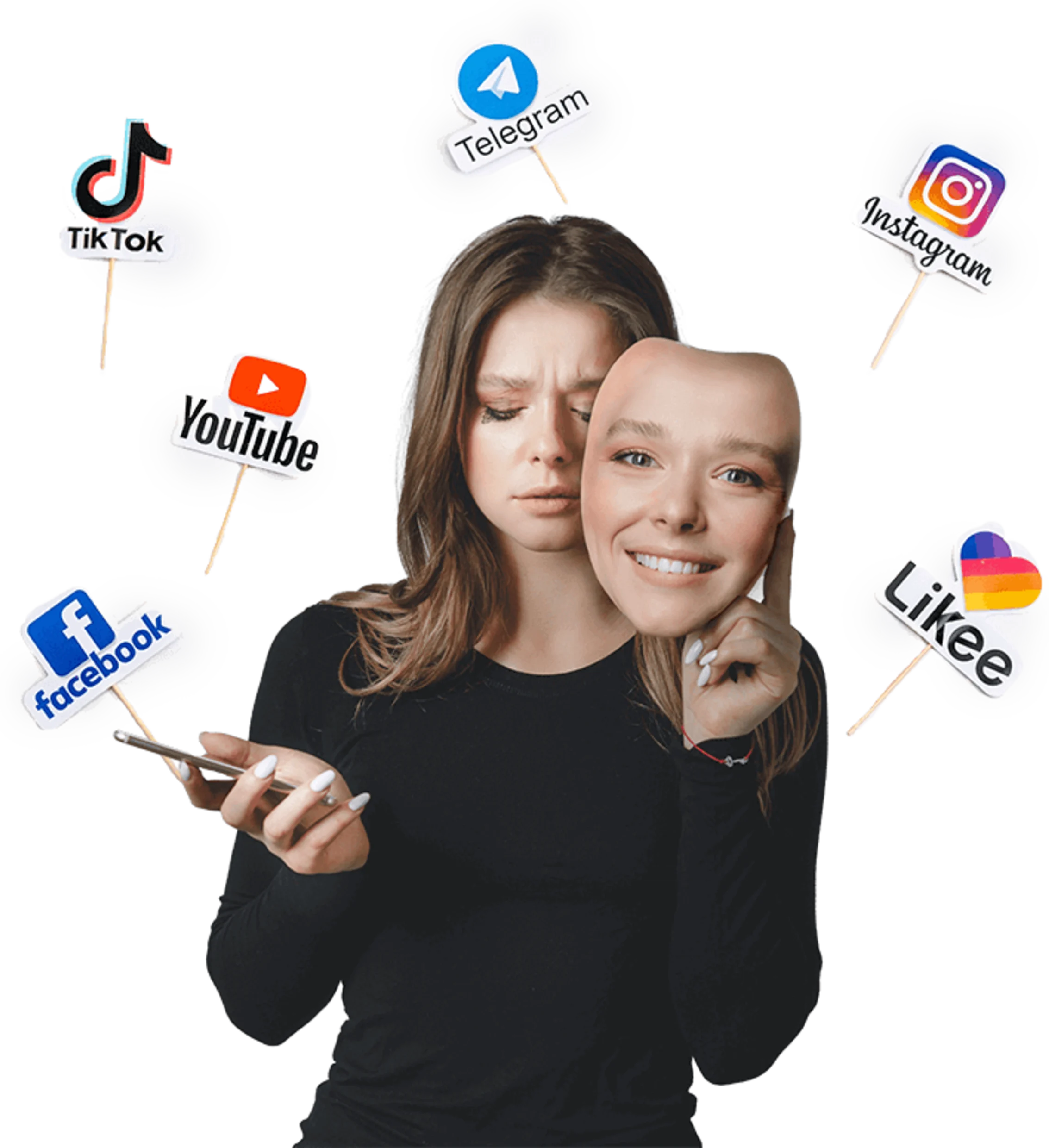A social media comparison evaluates the performance and features of various social media platforms. It helps businesses choose the best platform for their needs.
Businesses today rely heavily on social media for marketing and engagement. Understanding the strengths and weaknesses of each platform is crucial. Facebook, Instagram, Twitter, and LinkedIn offer different user experiences and tools. Analyzing metrics like user demographics, engagement rates, and advertising options can guide better decisions.
Social media comparison involves looking at features like post reach, user interaction, and content sharing capabilities. This comparison aids in maximizing marketing efforts and achieving business goals. By choosing the right platform, businesses can better connect with their target audience and enhance their online presence effectively.
Introduction To Social Media Comparison
Social media comparison is a common activity in today’s digital age. People often compare their lives to others on social platforms. This can impact their mental health and self-esteem. Understanding social media comparison is important.
Defining Social Media Comparison
Social media comparison happens when people look at others’ posts. They then compare their own lives to what they see online. This can be both positive and negative. People might feel motivated or jealous. It depends on how they view the comparison.
Why It Matters
Social media comparison matters for many reasons. It affects how people feel about themselves. It can lead to feelings of inadequacy and depression. It can also create unrealistic expectations. Here are some key points:
- Self-Esteem: Comparing yourself can lower your self-esteem.
- Mental Health: It can impact your mental health negatively.
- Real vs. Fake: People may compare their real lives to others’ highlight reels.
Understanding these points can help people manage their social media use better. They can learn to use social media in a healthier way.
Psychological Impact
Social media comparisons can deeply affect the mind. They can change how we see ourselves and the world. This section explores the psychological impact of social media comparisons.
Self-esteem Issues
Comparing yourself to others online can hurt your self-esteem. People often share only the best parts of their lives on social media. This can make you feel less happy with your own life.
Seeing others’ perfect photos and achievements can make you feel inadequate. This can lead to feelings of low self-worth. You might start to think that everyone else is doing better than you.
To combat this, remember that social media is not real life. People often curate their online presence to look perfect. Your worth is not measured by likes or followers.
Fomo And Anxiety
FOMO stands for Fear of Missing Out. This is a common feeling when using social media. Seeing others having fun can make you feel left out.
This feeling can lead to anxiety. You might worry about missing out on events or experiences. This can make you feel stressed and unhappy.
To reduce FOMO, limit your time on social media. Focus on real-life connections and experiences. Remember that no one shares everything online.
| Problem | Solution |
|---|---|
| Low Self-Esteem | Remember social media is curated |
| FOMO | Limit social media time |
Understanding the psychological impact of social media can help you manage your feelings. Stay mindful of how you use social media. Focus on your real-life happiness and well-being.
Positive Aspects
Social media comparison highlights strengths and opportunities for growth. It fosters healthier online habits and builds self-awareness. Users can develop a more balanced perspective by evaluating their online presence.
Motivation And Inspiration
Seeing others’ achievements can inspire you to reach your goals.
Building Connections
Interacting with diverse people helps in expanding your network.

Credit: www.leveragestl.com
Negative Aspects
Social media comparison often leads to negative outcomes. Users compare their lives to others, which can have several detrimental effects. Let’s explore some of the negative aspects of social media comparison.
Unrealistic Expectations
People often share curated and edited content on social media. This creates unrealistic expectations for others. Users may feel pressure to live up to these high standards. They may strive for perfection that doesn’t exist.
Photoshopped images and filtered videos can distort reality. This can make people feel inadequate. They may think their own lives are not good enough. This constant comparison can lead to dissatisfaction and disappointment.
Mental Health Concerns
Social media comparison can lead to serious mental health concerns. Users may experience anxiety and depression. They might feel that they are not living up to others’ lives.
- Low self-esteem
- Increased stress levels
- Feelings of loneliness
These mental health issues can affect daily functioning. People might withdraw from social activities. They may also neglect responsibilities.
| Mental Health Issue | Impact |
|---|---|
| Anxiety | Constant worry and fear |
| Depression | Persistent sadness and hopelessness |
| Low Self-Esteem | Feeling of worthlessness |
It is important to be aware of these negative aspects. Recognizing them can help us use social media more responsibly.
Role Of Algorithms
Algorithms play a crucial role in social media. They decide what content users see. These algorithms aim to keep users engaged. They filter and prioritize posts based on user behavior. Understanding these algorithms can help users make better comparisons.
Curated Content
Algorithms curate content to match user preferences. They track what users like, share, and comment on. Based on this data, they show similar posts. This makes the feed more personalized but also limits exposure to new ideas. Curated content keeps users on the platform longer. It ensures they see what they find interesting.
Echo Chambers
Echo chambers form due to algorithmic curation. Users see only content they agree with. This reinforces their existing beliefs. It can create a narrow view of the world. This is because opposing viewpoints get filtered out. Echo chambers can affect social media comparison. Users may think their view is the only view. This can lead to misinformation and bias.
| Algorithm Role | Impact |
|---|---|
| Curated Content | Personalized feed, limited new ideas |
| Echo Chambers | Reinforced beliefs, filtered opposing views |
Understanding these roles can enhance social media experience. Users can be more aware of their feed’s limitations. This awareness can lead to healthier social media habits.

Credit: www.wondermind.com
Managing Comparisons
Many people spend a lot of time on social media. This can lead to comparing oneself with others. This habit can harm mental health. Managing these comparisons is crucial. Here are some effective strategies to help you.
Mindfulness Techniques
Mindfulness can help reduce the impact of comparisons. It involves being present in the moment. Here are some techniques you can try:
- Deep Breathing: Take slow, deep breaths to calm your mind.
- Body Scan: Focus on each part of your body, one at a time.
- Gratitude Journaling: Write down things you are grateful for daily.
- Guided Meditation: Use apps or videos to help you meditate.
Setting Boundaries
Setting boundaries can help manage social media use. It prevents excessive comparisons. Here are some ways to set effective boundaries:
| Boundary | Description |
|---|---|
| Time Limits | Set a daily limit for social media use. |
| No-Phone Zones | Designate areas where phones are not allowed. |
| Turn Off Notifications | Disable social media notifications to reduce distractions. |
| Follow Positive Accounts | Only follow accounts that make you feel good. |
Influence On Youth
Social media comparison can deeply affect young people. They constantly see images of perfect lives. This can make them feel inadequate and anxious. Understanding how this affects youth is crucial for parents and educators.
Adolescent Vulnerability
Teenagers are at a critical stage of development. They are more vulnerable to social media comparisons. These comparisons can lead to feelings of jealousy, depression, and low self-esteem.
Studies show that excessive social media use increases these feelings. Teens see filtered, edited images and believe them to be real. This can distort their perception of reality.
Below is a table showing the impact of social media on adolescents:
| Impact | Percentage |
|---|---|
| Feelings of Inadequacy | 75% |
| Increased Anxiety | 68% |
| Depression | 50% |
Parental Guidance
Parents play a vital role in guiding their children through social media use. Open communication is key. Discussing the difference between real and online life helps.
Here are some tips for parents:
- Encourage open conversations about social media.
- Monitor social media use without being intrusive.
- Promote offline activities and hobbies.
- Set clear boundaries for social media use.
By following these tips, parents can help mitigate the negative impact of social media comparisons.

Credit: www.thefledger.com
Future Trends
Understanding future trends in social media is crucial for staying ahead. These trends can shape how users interact with platforms. Let’s explore the key areas driving these changes.
Emerging Platforms
New social media platforms are constantly emerging. Each offers unique features and experiences. These platforms can quickly gain popularity among users.
Some key emerging platforms include:
- Clubhouse: An audio-based social network.
- TikTok: Short video content that has gone viral.
- BeReal: A platform promoting genuine, unfiltered moments.
Businesses must monitor these platforms. Early adoption can provide a competitive advantage.
Changing User Behavior
Users are changing how they interact with social media. They are seeking more authentic content and connections. This shift affects how brands engage with their audience.
Some key changes in user behavior include:
- Increased Video Consumption: Users prefer video content.
- Short Attention Spans: Users favor short, engaging content.
- Privacy Concerns: Users are more concerned about data privacy.
Brands must adapt to these changes. Creating authentic and engaging content is essential.
| Trend | Impact on Social Media |
|---|---|
| Emerging Platforms | New opportunities for engagement and brand presence |
| Changing User Behavior | Need for more authentic and engaging content |
Staying updated with these trends can enhance social media strategies. Embrace change to stay relevant and connected with your audience.
Frequently Asked Questions
What Do You Mean By Social Comparison?
Social comparison involves evaluating oneself against others. People measure their abilities, achievements, and opinions through this process.
Which Is An Example Of Social Comparison?
Comparing your work performance with a colleague’s achievements is an example of social comparison. This helps gauge self-improvement.
What Is Social Media Comparison And Envy?
Social media comparison and envy occur when users compare their lives to others’ posts, leading to feelings of inadequacy and jealousy.
What Are The Basics Of Social Comparison?
Social comparison involves evaluating oneself against others. It helps in self-assessment and understanding social standing. People compare abilities, opinions, and traits. This can influence self-esteem and motivation. Social comparison is either upward or downward, impacting emotions and behaviors.
Conclusion
Understanding social media comparisons can elevate your marketing strategies. It helps identify strengths and weaknesses. Gain insights to outshine competitors. Regularly evaluate your efforts for continuous improvement. Leverage this knowledge to boost engagement and drive success. Stay ahead by mastering social media comparisons.